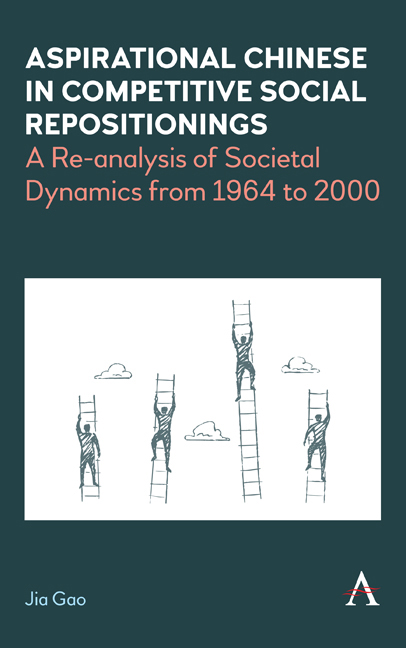 Aspirational Chinese in Competitive Social Repositionings
Aspirational Chinese in Competitive Social Repositionings Book contents
- Frontmatter
- Contents
- List of Abbreviations
- List of Figures
- List of Tables
- Preface and Acknowledgements
- One The Absence of Everyday Chinese in the Dichotomous Paradigm
- Two Rebranding the Communist Heir Narrative and the Cultural Revolution
- Three Tearing the Utopian Veil Down By the Sent-Down Youth
- Four Crying Out for Changes in the Second Half of the 1970s
- Five Battling for the Advantages Under the Dengist Political Alliances
- Six Climbing Different Social Ladders From the Mid-1980s
- Seven Filling in the Post-1989 Vacuum Left By Educated Liberals
- Eight Seizing Chances to Be Entrepreneurial in Post-1992 China
- Nine Towards a Theory of Competitive Social Repositioning
- References
- Index
One - The Absence of Everyday Chinese in the Dichotomous Paradigm
Published online by Cambridge University Press: 28 February 2024
- Frontmatter
- Contents
- List of Abbreviations
- List of Figures
- List of Tables
- Preface and Acknowledgements
- One The Absence of Everyday Chinese in the Dichotomous Paradigm
- Two Rebranding the Communist Heir Narrative and the Cultural Revolution
- Three Tearing the Utopian Veil Down By the Sent-Down Youth
- Four Crying Out for Changes in the Second Half of the 1970s
- Five Battling for the Advantages Under the Dengist Political Alliances
- Six Climbing Different Social Ladders From the Mid-1980s
- Seven Filling in the Post-1989 Vacuum Left By Educated Liberals
- Eight Seizing Chances to Be Entrepreneurial in Post-1992 China
- Nine Towards a Theory of Competitive Social Repositioning
- References
- Index
Summary
This chapter is the introductory chapter of this book, which starts with an overall historical view of what had happened in China from 1964 to 2000, and why this period is chosen to be re-analysed. The focus of this chapter, however, is on the limitations of the existing scholarship on China's social dynamics and change, which are found to be characterised by the evident absence of ordinary, but aspirational, people in the dichotomous paradigm of examining societal forces at work and possible subsequent changes to socio-economic and socio-political landscape and climate. Since this research aims to fill this knowledge and analytical gap, which has both theoretical and practical implications, the objective of this current chapter is to place the analysis in its historical and theoretical contexts.
As noted in the preface, over the past four or so decades a significant amount of research has studied a fast-changing China. The volume of this body of literature, in both English and Chinese, is such that many new and young researchers, and general readers as well, are often overwhelmed or may even be scared off this overheated research field. Careful review reveals, however, that past research has predominantly centred on either the ruling party or its outspoken opponents, and the so-called silent majority of China's large population is examined only sporadically, if at all. This dichotomous paradigm is reviewed in the second section of this chapter; however, two general epistemological, cognitive and methodological issues seem to be behind the research focus.
The first problem is that of ‘herd’ or ‘flocking’ behaviour in the academic research. This is a rather broad issue and beyond the scope of this analysis, but it is worth noting that modern-day academic fields and their practices have certain limits and biases. Flocking behaviour – defined by one French professor, a Nobel Prize winner in economics, as the tendency for a particular subject to ‘hog the attention of the scientific community while equally important subjects are neglected’ (Tirole 2017, 97) – is one such constraint. In a Chinese phrase, it might be termed renyun yiyun (echoing the views of others or repeating what someone has said). In the field of China studies, this herd behaviour refers to at least two types of issues.
- Type
- Chapter
- Information
- Aspirational Chinese in Competitive Social RepositioningsA Re-Analysis of Societal Dynamics from 1964 to 2000, pp. 1 - 26Publisher: Anthem PressPrint publication year: 2023
